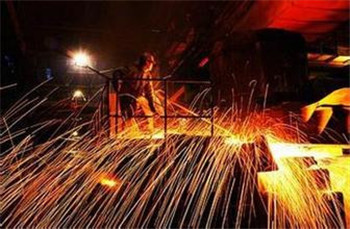
China's biggest 101 steel companies, which helped fuel the country’s industrial revolution and housing frenzy, lost a combined Rmb72bn ($11bn) in the first 10 months of 2015, or more than double the profits garnered last year.
2015年头10个月,中国最大的101家钢铁企业总共亏损720亿元人民币(合110亿美元),超过去年所获利润的两倍。这些钢铁企业曾帮助点燃了中国的工业革命和楼市狂潮。
The reversal in fortunes highlights the unwinding of rapacious demand for basic materials — in just two years the country produced more cement than the US did in the entire 20th century — as economic growth slows.
钢企命运的逆转凸显出,随着经济增长放缓,中国对基本材料的疯狂需求正逐渐退潮。此前,在仅仅两年内,中国生产的水泥就超过了美国在整个20世纪的产量。
The resulting brake on demand is sending tremors across the globe, from resource-rich Brazil and Australia through to UK steelmakers.
从资源丰富的巴西和澳大利亚,到英国的炼钢厂,中国行情变化导致的需求停滞发出的冲击波正在传遍全球。
Beijing’s efforts to force domestic consolidation have largely failed, leaving a swathe of industries churning out steel, cement and glass at a loss and feeding deflation. It is also piling up fresh debts: Sinosteel, China’s largest state-owned steel trader, defaulted on a bond repayment due in October.
中国政府试图在国内强制开展整合的努力在很大程度上未能成功,只留下一群以亏损价格大量生产钢铁、水泥和玻璃的产业,导致通缩愈演愈烈。这种局面还导致新的债务不断积累:中国最大的国有钢材交易商中钢集团(Sinosteel)就曾违约一笔本该10月份偿还的债券。
China’s property sector, the biggest source of steel demand, is still struggling. Chinese home prices and sales volumes recently began rising following more than a year of declines, but construction activity continues to fall as developers wait for the market to digest the overhang of unsold homes.
中国的房地产业是钢材需求的最大源头,目前该行业仍在挣扎之中。最近,在超过一年的下滑之后,中国的房价和销售量已开始上升,不过建设活动依然在下滑,原因是开发商在等待市场消化过高的未出售住房。
“The need for social stability (is) the biggest stepping stone for a quick solution to the capacity overhang. Employment associated with steel mills is large enough that staff layoffs could spark social unrest,” HSBC analysts led by Chris Chen wrote in a note on Friday.
周五,以Chris Chen为首的汇丰银行(HSBC)分析师在一份报告中写道:“对社会稳定的需要(是)快速解决产能过剩问题的最大绊脚石。与炼钢厂相关的就业人员规模太大,裁员可能会引发社会动荡。”
“We also expect a prolonged stalemate between government-supported loss-making (state-owned) mills and the relatively profitable private mills — which however, lack favourable support.”
“我们还预计,在政府支持的亏损(国有)钢厂和盈利能力相对较强(却缺乏适当支持)的民营钢厂之间的僵局会长期存在。”
China has shuttered 50m tonnes of steel manufacturing capacity this year, just 4 per cent of its total 1.14bn tonnes of capacity, according to HSBC. The bank calculates China would need to cut an additional 120m to 160m tonnes of capacity next year for the industry-wide utilisation rate to reach a “relatively healthy” level of 80 per cent.
根据汇丰银行的数据,今年中国已关停5000万吨炼钢产能,只占其总计11.4亿吨产能的4%。根据该行计算,中国明年需要再削减1.2亿吨至1.6亿吨产能,才能令全行业产能利用率达到80%这个“相对健康”的水平
Of the 101 largest steel companies, 48 suffered net losses in the first 10 months of the year. For the full group, combined losses totalled Rmb39bn, according to unreleased China Iron and Steel Association figures obtained by Economic Information Daily, a newspaper owned by the official Xinhua news agency. Excluding earnings from non-core business, combined losses were Rmb72bn.
在所有101家最大钢企中,48家在今年头10个月遭遇净亏损。根据中国官方新华社旗下的《经济参考报》(Economic Information Daily)所获的中国钢铁工业协会(China Iron and Steel Association)未公开数据,所有这些企业的总亏损总计达390亿元人民币。排除来自非核心业务的盈利,总亏损达720亿元人民币。
Steel market conditions are deteriorating. Core-business losses in October alone were Rmb15bn, 28 per cent larger than in September, according to the paper. China’s official purchasing manager’s index for the steel sector fell to 37 in November, down 5.2 points from October. An reading of below 50 signals contraction.
钢铁市场的状况正在恶化。根据该报的说法,仅10月份的核心业务亏损就达150亿元人民币,比9月份高了28%。11月份中国官方钢铁部门采购经理人指数(PMI)滑落至37,比10月份低了5.2,。该读数低于50,表示相关产业处于收缩之中。
After growing at an average rate of 15 per cent between 2000 and 2013, CISA forecasts that Chinese steel production has already peaked and will fall 3 per cent next year. However, iron ore producers such as BHP Billiton, Rio Tinto and Vale, who ploughed billions of dollars into expanding production over the past decade, are still clinging to more optimistic forecasts for Chinese production.
中国钢铁工业协会预计,在2000年至2013年期间出现15%的平均增长率之后,中国钢铁产量已经见顶,明年将下跌3%。然而,必和必拓(BHP Billiton)、力拓(Rio Tinto)和淡水河谷(Vale)等铁矿石生产商仍坚持对中国钢铁生产的更乐观预期。过去十年间,这三家生产商曾投入数十亿美元扩张产能。












